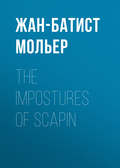
Мольер (Жан-Батист Поклен)
The Blunderer
SCENE IV. – LELIO, LEANDER, MASCARILLE
LEL. Oh! that's lucky; there he is. Come hither, cursed hangdog!
MASC. What is the matter?
LEL. You serpent's tongue! so full of lies! dare you fasten your stings on Celia, and slander the most consummate virtue that ever added lustre to misfortune?
MASC. (In a whisper to Lelio). Gently; I told him so on purpose.
LEL. No, no; none of your winking, and none of your jokes. I am blind and deaf to all you do or say. If it were my own brother he should pay dear for it; for to dare defame her whom I adore is to wound me in the most tender part. You make all these signs in vain. What was it you said to him?
MASC. Good Heavens! do not quarrel, or I shall leave you.
LEL. You shall not stir a step.
MASC. Oh!
LEL. Speak then; confess.
MASC. (Whispering to Lelio). Let me alone. I tell you it is a stratagem.
LEL. Make haste; what was it you said? Clear up this dispute between us.
MASC. (In a whisper to Lelio). I said what I said. Pray do not put yourself in a passion.
LEL. (Drawing his sword). I shall make you talk in another strain.
LEAND. (Stopping him). Stay your hand a little; moderate your ardour.
MASC. (Aside). Was there ever in the world a creature so dull of understanding?
LEL. Allow me to wreak my just vengeance on him.
LEAND. It is rather too much to wish to chastise him in my presence.
LEL. What! have I no right, then, to chastise my own servant?
LEAND. What do you mean by saying "your servant?"
MASC. (Aside). He is at it again! He will discover all.
LEL. Suppose I had a mind to thrash him within an inch of his life, what then? He is my own servant.
LEAND. At present he is mine.
LEL. That is an admirable joke. How comes he to be yours? Surely…
MASC. (In a whisper). Gently.
LEL. What are you whispering?
MASC. (Aside). Oh! the confounded blockhead. He is going to spoil everything, He understands not one of my signs.
LEL. You are dreaming, Leander. You are telling me a pretty story! Is he not my servant?
LEAND. Did you not discharge him from your service for some fault?
LEL. I do not know what this means.
LEAND. And did you not, in the violence of your passion, make his back smart most unmercifully?
LEL. No such thing. I discharge him! cudgel him! Either you make a jest of me, Leander, or he has been making a jest of you.
MASC. (Aside). Go on, go on, numskull; you will do your own business effectually.
LEAND. (To Mascarille). Then all this cudgelling is purely imaginary?
MASC. He does not know what he says; his memory…
LEAND. No, no; all these signs do not look well for you. I suspect some prettily contrived trick here; but for the ingenuity of the invention, go your ways, I forgive you. It is quite enough that I am undeceived, and see now why you imposed upon me. I come off cheap, because I trusted myself to your hypocritical zeal. A word to the wise is enough. Farewell, Lelio, farewell; your most obedient servant.
SCENE V. – LELIO, MASCARILLE
MASC. Take courage, my boy, may fortune ever attend us I Let us draw and bravely take the field; let us act Olibrius, the slayer of the innocents.
[Footnote: Olibrius was, according to ancient legends, a Roman governor of Gaul, in the time of the Emperor Decius, very cruel, and a great boaster.]
LEL. He accused you of slandering…
MASC. And you could not let the artifice pass, nor let him remain in his error, which did you good service, and which pretty nearly extinguished his passion. No, honest soul, he cannot bear dissimulation. I cunningly get a footing at his rival's, who, like a dolt, was going to place his mistress in my hands, but he, Lelio, prevents me getting hold of her by a fictitious letter; I try to abate the passion of his rival, my hero presently comes and undeceives him. In vain I make signs to him, and show him it was all a contrivance of mine; it signifies nothing; he continues to the end, and never rests satisfied till he has discovered all. Grand and sublime effect of a mind which is not inferior to any man living! It is an exquisite piece, and worthy, in troth, to be made a present of to the king's private museum.
LEL. I am not surprised that I do not come up to your expectations; if I am not acquainted with the designs you are setting on foot, I shall be for ever making mistakes.
MASC. So much the worse.
LEL. At least, if you would be justly angry with me, give me a little insight into your plan; but if I am kept ignorant of every contrivance, I must always be caught napping.
[Footnote: The original is, je suis pris sans vert, "I am taken without green," because in the month of May, in some parts of France, there is a game which binds him or her who is taken without a green leaf about them to pay a forfeit.]
MASC. I believe you would make a very good fencing-master, because you are so skilful at making feints, and at parrying of a thrust.
[Footnote: In the original we find prendre les contretemps, and rompre les mesures. In a little and very curious book, "The Scots Fencing Master, or Compleat Smal-Sword Man," printed in Edinburgh 1687, and written by Sir William Hope of Kirkliston, the contre-temps is said to be: "When a man thrusts without having a good opportunity, or when he thrusts at the same time his adversarie thrusts, and that each of them at that time receive a thrust." Breaking of measure is, according to the same booklet, done thus: "When you perceive your adversary thrusting at you, and you are not very certain of the parade, then break his measure, or make his thrust short of you, by either stepping a foot or half a foot back, with the single stepp, for if you judge your adversary's distance or measure well, half a foot will break his measure as well as ten ells."]
LEL. Since the thing is done, let us think no more about it. My rival, however, will not have it in his power to cross me, and provided you will but exert your skill, in which I trust…
MASC. Let us drop this discourse, and talk of something else; I am not so easily pacified, not I; I am in too great a passion for that. In the first place, you must do me a service, and then we shall see whether I ought to undertake the management of your amours.
LEL. If it only depends on that, I will do it! Tell me, have you need of my blood, of my sword?
MASC. How crack-brained he is! You are just like those swashbucklers who are always more ready to draw their sword than to produce a tester, if it were necessary to give it.
LEL. What can I do, then, for you?
MASC. You must, without delay, endeavour to appease your father's anger.
LEL. We have become reconciled already.
MASC. Yes, but I am not; I killed him this morning for your sake; the very idea of it shocks him. Those sorts of jokes are severely felt by such old fellows as he, which, much against their will, make them reflect sadly on the near approach of death. The good sire, notwithstanding his age, is very fond of life, and cannot bear jesting upon that subject; he is alarmed at the prognostication, and so very angry that I hear he has lodged a complaint against me. I am afraid that if I am once housed at the expense of the king, I may like it so well after the first quarter of an hour, that I shall find it very difficult afterwards to get away. There have been several warrants out against me this good while; for virtue is always envied and persecuted in this abominable age. Therefore go and make my peace with your father.
LEL. Yes, I shall soften his anger, but you must promise me then…
MASC. We shall see what there is to be done. (Exit Lelio). Now, let us take a little breath after so many fatigues; let us stop for a while the current of our intrigues, and not move about hither and thither as if we were hobgoblins. Leander cannot hurt us now, and Celia cannot be removed, through the contrivance of…
SCENE VI. – ERGASTE, MASCARILLE
ERG. I was looking for you everywhere to render you a service. I have a secret of importance to disclose.
MASC. What may that be?
ERG. Can no one overhear us?
MASC. Not a soul.
ERG. We are as intimate as two people can be; I am acquainted with all your projects, and the love of your master. Mind what you are about by and by; Leander has formed a plot to carry off Celia; I have been told he has arranged everything, and designs to get into Trufaldin's house in disguise, having heard that at this time of the year some ladies of the neighbourhood often visit him in the evening in masks.
MASC. Ay, well! He has not yet reached the height of his happiness; I may perhaps be beforehand with him; and as to this thrust, I know how to give him a counter-thrust, by which he may run himself through. He is not aware with what gifts I am endowed. Farewell, we shall take a cup together next time we meet.
SCENE VII. – MASCARILLE, alone
We must, we must reap all possible benefit from this amorous scheme, and by a dexterous and uncommon counterplot endeavour to make the success our own, without any danger. If I put on a mask and be beforehand with Leander, he will certainly not laugh at us; if we take the prize ere he comes up, he will have paid for us the expenses of the expedition; for, as his project has already become known, suspicion will fall upon him; and we, being safe from all pursuit, need not fear the consequences of that dangerous enterprise. Thus we shall not show ourselves, but use a cat's paw to take the chesnuts out of the fire. Now, then, let us go and disguise ourselves with some good fellows; we must not delay if we wish to be beforehand with our gentry. I love to strike while the iron is hot, and can, without much difficulty, provide in one moment men and dresses. Depend upon it, I do not let my skill lie dormant. If Heaven has endowed me with the gift of knavery, I am not one of those degenerate minds who hide the talents they have received.
SCENE VIII. – LELIO, ERGASTE
LEL. He intends to carry her off during a masquerade!
ERG. There is nothing more certain; one of his band informed me of his design, upon which I instantly ran to Mascarille and told him the whole affair; he said he would spoil their sport by some counter-scheme which he planned in an instant; so meeting with you by chance, I thought I ought to let you know the whole.
LEL. I am very much obliged to you for this piece of news; go, I shall not forget this faithful service.
[Exit Ergaste.]
SCENE IX. – LELIO, alone
My rascal will certainly play them some trick or other; but I, too, have a mind to assist him in his project. It shall never be said that, in a business which so nearly concerns me, I stirred no more than a post; this is the time; they will be surprised at the sight of me. Why did I not take my blunderbuss with me? But let anybody attack me who likes, I have two good pistols and a trusty sword. So ho! within there; a word with you.
SCENE X. – TRUFALDIN at his window, LELIO
TRUF. What is the matter? Who comes to pay me a visit?
LEL. Keep your door carefully shut to-night.
TRUF. Why?
LEL. There are certain people coming masked to give you a sorry kind of serenade; they intend to carry off Celia.
TRUF. Good Heavens!
LEL. No doubt they will soon be here. Keep where you are, you may see everything from your window. Hey! Did I not tell you so? Do you not see them already? Hist! I will affront them before your face. We shall see some fine fun, if they do not give way.
[Footnote: This is one of the passages of Molière about which commentators do not agree; the original is, nous allons voir beau jeu, si la corde ne rompt. Some maintain that corde refers to the tight rope of a rope dancer; others that corde means the string of a bow, as in the phrase avoir deux cordes a son arc, to have two strings (resources) to one's bow. Mons. Eugène Despois, in his carefully edited edition of Molière, (i., 187), defends the latter reading, and I agree with him.]
SCENE XI. – LELIO, TRUFALDIN, MASCARILLE, and his company masked
TRUF. Oh, the funny blades, who think to surprise me.
LEL. Maskers, whither so fast? Will you let me into the secret? Trufaldin, pray open the door to these gentry, that they may challenge us for a throw with the dice.
[Footnote: The original has jouer un momon. Guy Miege, in his Dictionary of barbarous French. London, 1679 has "Mommon, a mummer, also a company of mummers; also a visard, or mask; also a let by a mummer at dice."]
(To Mascarille, disguised as a woman). Good Heavens! What a pretty creature! What a darling she looks! How now! What are you mumbling? Without offence, may I remove your mask and see your face.
TRUF. Hence! ye wicked rogues; begone, ye ragamuffins! And you, sir, good night, and many thanks.
SCENE XII. – LELIO, MASCARILLE
LEL. (After having taken the mask from Mascarille's face).
Mascarille, is it you?
MASC. No, not at all; it is somebody else.
LEL. Alas! How astonished I am! How adverse is our fate! Could I possibly have guessed this, as you did not secretly inform me that you were going to disguise yourself? Wretch that I am, thoughtlessly to play you such a trick, while you wore this mask. I am in an awful passion with myself, and have a good mind to give myself a sound beating.
MASC. Farewell, most refined wit, unparalleled inventive genius.
LEL. Alas! If your anger deprives me of your assistance, what saint shall I invoke?
MASC. Beelzebub.
LEL. Ah! If your heart is not made of stone or iron, do once more at least forgive my imprudence; if it is necessary to be pardoned that I should kneel before you, behold…
MASC. Fiddlesticks! Come, my boys, let us away; I hear some other people coming closely behind us.
SCENE XIII. – LEANDER and his company masked; TRUFALDIN at the window
LEAND. Softly, let us do nothing but in the gentlest manner.
TRUF. (At the window). How is this? What! mummers besieging my door all night. Gentlemen, do not catch a cold gratuitously; every one who is catching it here must have plenty of time to lose. It is rather a little too late to take Celia along with you; she begs you will excuse her to-night; the girl is in bed and cannot speak to you; I am very sorry; but to repay you for all the trouble you have taken for her sake, she begs you will be pleased to accept this pot of perfume.
LEAND. Faugh! That does not smell nicely. My clothes are all spoiled; we are discovered; let us be gone this way.
ACT IV
SCENE I. – LELIO, disguised as an Armenian; MASCARILLE
MASC. You are dressed in a most comical fashion.
LEL. I had abandoned all hope, but you have revived it again by this contrivance.
MASC. My anger is always too soon over; it is vain to swear and curse, I can never keep to my oaths.
LEL. Be assured that if ever it lies in my power you shall be satisfied with the proofs of my gratitude, and though I had but one piece of bread…
MASC. Enough: Study well this new project; for if you commit now any blunder, you cannot lay the blame upon ignorance of the plot; you ought to know your part in the play perfectly by heart.
LEL. But how did Trufaldin receive you?
MASC. I cozened the good fellow with a pretended zeal for his interests. I went with alacrity to tell him that, unless he took very great care, some people would come and surprise him; that from different quarters they had designs upon her of whose origin a letter had given a false account; that they would have liked to draw me in for a share in the business, but that I kept well out of it; and that, being full of zeal for what so nearly concerned him, I came to give him timely notice that he might take his precautions. Then, moralizing, I discoursed solemnly about the many rogueries one sees every day here below; that, as for me, being tired with the world and its infamies, I wished to work out my soul's salvation, retire from all its noise, and live with some worthy honest man, with whom I could spend the rest of my days in peace; that, if he had no objection, I should desire nothing more than to pass the remainder of my life with him; that I had taken such a liking to him, that, without asking for any wages to serve him, I was ready to place in his hands, knowing it to be safe there, some property my father had left me, as well as my savings, which I was fully determined to leave to him alone, if it pleased Heaven to take me hence. That was the right way to gain his affection. You and your beloved should decide what means to use to attain your wishes. I was anxious to arrange a secret interview between you two; he himself has contrived to show me a most excellent method, by which you may fairly and openly stay in her house. Happening to talk to me about a son he had lost, and whom he dreamt last night had come to life again, he told me the following story, upon which, just now, I founded my stratagem.
LEL. Enough; I know it all; you have told it me twice already.
[Footnote: Though Lelio says to Mascarille, "Enough, I know it all," he has not been listening to the speech of his servant, but, in the meanwhile, is arranging his dress, and smoothing his ruffles, and making it clear to the spectator that he knows nothing, and that he will be a bad performer of the part assigned to him. This explains the blunders he makes afterwards in the second and fifth scenes of the same act.]
MASC. Yes, yes; but even if I should tell it thrice, it may happen still, that with all your conceit, you might break down in some minor detail.
LEL. I long to be at it already.
MASC. Pray, not quite so fast, for fear we might stumble. Your skull is rather thick, therefore you should be perfectly well instructed in your part. Some time ago Trufaldin left Naples; his name was then Zanobio Ruberti. Being suspected in his native town of having participated in a certain rebellion, raised by some political faction (though really he is not a man to disturb any state), he was obliged to quit it stealthily by night, leaving behind him his daughter, who was very young, and his wife. Some time afterwards he received the news that they were both dead, and in this perplexity, wishing to take with him to some other town, not only his property, but also the only one who was left of all his family, his young son, a schoolboy, called Horatio, he wrote to Bologna, where a certain tutor, named Alberto, had taken the boy when very young, to finish there his education; but though for two whole years he appointed several times to meet them, they never made their appearance. Believing them to be dead, after so long a time, he came to this city, where he took the name he now bears, without for twelve years ever having discovered any traces of this Alberto, or of his son Horatio. This is the substance of the story, which I have repeated so that you may better remember the groundwork of the plot. Now, you are to personate an Armenian merchant, who has seen them both safe and sound in Turkey. If I have invented this scheme, in preference to any other, of bringing them to life again according to his dream, it is because it is very common in adventures for people to be taken at sea by some Turkish pirate, and afterwards restored to their families in the very nick of time, when thought lost for fifteen or twenty years. For my part, I have heard a hundred of that kind of stories. Without giving ourselves the trouble of inventing something fresh, let us make use of this one; what does it matter? You must say you heard the story of their being made slaves from their own mouths, and also that you lent them money to pay their ransom; but that as urgent business obliged you to set out before them, Horatio asked you to go and visit his father here, whose adventures he was acquainted with, and with whom you were to stay a few days till their arrival. I have given you a long lesson now.
LEL. These repetitions are superfluous. From the very beginning I understood it all.
MASC. I shall go in and prepare the way.
LEL. Listen, Mascarille, there is only one thing that troubles me; suppose he should ask me to describe his son's countenance?
MASC. There is no difficulty in answering that! You know he was very little when he saw him last. Besides it is very likely that increase of years and slavery have completely changed him.
LEL. That is true. But pray, if he should remember my face, what must I do then?
MASC. Have you no memory at all? I told you just now, that he has merely seen you for a minute, that therefore you could only have produced a very transient impression on his mind; besides, your beard and dress disguise you completely.
LEL. Very well. But, now I think of it, what part of Turkey…?
MASC. It is all the same, I tell you, Turkey or Barbary.
LEL. But what is the name of the town I saw them in?
MASC. Tunis. I think he will keep me till night. He tells me it is useless to repeat that name so often, and I have already mentioned it a dozen times.
LEL. Go, go in and prepare matters; I want nothing more.
MASC. Be cautious at least, and act wisely. Let us have none of your inventions here.
LEL. Let me alone! Trust to me, I say, once more.
MASC. Observe, Horatio, a schoolboy in Bologna; Trufaldin, his true name Zanobio Ruberti, a citizen of Naples; the tutor was called Alberto…
LEL. You make me blush by preaching so much to me; do you think I am a fool?
MASC. No, not completely, but something very like it.







